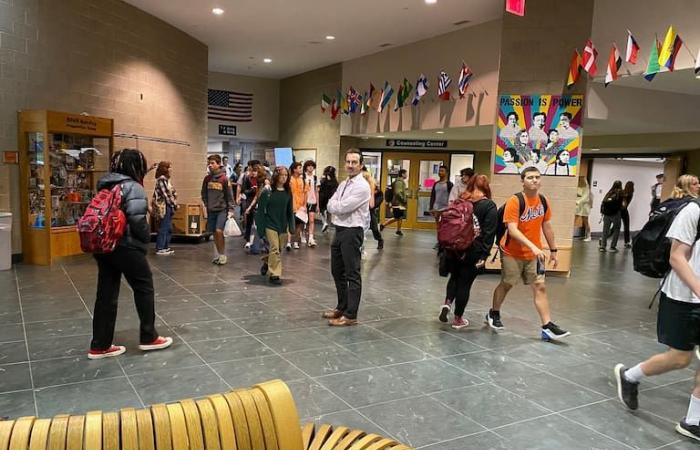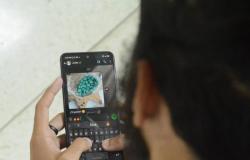Hear
NEW YORK.– “It’s like going back to the 80s.” That’s what preceptors at Bethlehem Central High School told Principal Dave Doemel a few months ago, when he implemented a total ban on cell phones at that educational institution in the suburbs of Albany, New York state.
Students attending Bethlehem are now required to leave all electronic devices in a pencil case. locked during the entire school daya policy change that was “totally transformative” from the first week, Doemel says as he tours the school.
The director points his finger towards the cafeteria as if it were a miracle: small groups of boys and girls chatting, against a background of colliding trays and dragging chairs. It all seemed very normal to me. But maybe that’s because the last time I was in a high school cafeteria was…in the ’80s.
I tend to distrust complaints that consider the past as the norm and the present as its dangerous deviation. When alarm bells start ringing about falling marriage rates or because Generation Z is abandoning religions in droves, I actually wonder how many of those people got married for lack of better options or how many went to church even though they didn’t know it. they felt comfortable.
The past, however familiar it may be, was not necessarily better.
For this reason, and a little reluctantly, I have to admit that today kids are on their cell phones too much. A recent Gallup poll shows that teens spend an average of nearly five hours a day exclusively on social media, not including hours of video games or texting. And a report from Common Sense Media found that teens check their phones an average of more than 100 times a day.
All that screen time is bad for teens’ mental health. Intensive cell phone use conspires against social interaction and turn bullying into a weapon. mobile phones they also distract. Even when they are not used, there they are, ready in the backpack or pocket, saying: “Hey! Look! Here I am!” And that makes it harder to concentrate on anything, and even more so if it’s a trigonometry class. In fact, research reveals a correlation between cell phone use and lower test scores.
More and more schools are trying to contain the damage restricting phone use in class: That’s what Bethlehem Central High School tried first. But distraction in the classroom is not the only problem. According to Principal Doemel, with the use of phones outside the classroom, every fight in the playground was recorded and posted online, every insult or provocation was shared, gaining strength as it bounced from application to application.
So Doemel pushed for an outright ban, and the school board voted unanimously in favor. Parents also had their doubts.: They were worried about not being able to communicate with their children during the day or that they would be isolated in case of an emergency. But they could still call their parents’ office or even send an email: all students have notebooks and all classrooms have phones to call 911.
There was also resistance from some teachers, who believed that students should be treated like adults. It is a fairly common argument: if we do not teach them self-control and good judgment from a young age, we leave them unprepared for life.
But how to prepare students to resist a technology designed to be addictive? In fact, adults can’t do it either. Doemel compares that argument to “giving a child a cigarette and saying, ‘Here, but be responsible.’” As much as a high school student wants to be responsible, she can’t.
The next day, I visited Guilderland, another suburban Albany high school that my children attended. Guilderland doesn’t ban phones, but Principal Mike Piscitelli told me the school bought cellphone bags and hung them on classroom doors. Each teacher sets his or her rules and the school management strives to support them. “No one wants to be the bad guy”, he expresses.
Refers to teachers. But the municipalities are also cautious, even though they know that cell phones in schools are not good. Piscitelli has confirmed the damage that constant access to social networks causes to children and the educational community. “If a conflict is generated, it no longer ends,” he stated. Go and go”.
I didn’t see any conflict when I visited the study room with Piscitelli, although who knows what was hidden inside the little magical devices that each student had next to (or instead of) their work papers. I asked the librarian who supervised them if in her 20 years at Guilderland she had noticed any changes. “Oh yeah: students no longer know how to maintain a conversation“, answered me.
On the way back we passed a grassy yard where three girls were sitting in the sun, looking at their phones. “They find it difficult to resist the attraction of the cell phone”, Piscitelli had told me before. I couldn’t help but imagine a trio of sunflowers crouched down, looking down at the ground.
Guilderland is following Bethlehem’s prohibition experience closely, as are many other local schools. More than 20 have already visited to experience the animation that exists in the cafeteria, listen to the typical bullfights between one class and another, and marvel at the students who walk through the hallways with their heads held high.
But are they willing to be the bad guy?
The question is not whether children today are addicted to their phones or whether that addiction affects your mental health, your social skills and your community. Of course they are addicted to their cell phones, and of course that affects them negatively. But the question is whether we are willing to use schools to try to break that addiction. Or at least give the kids a seven-hour break, 180 days a year.
I asked Doemel if he had been surprised by anything after the ban. He confided to me that until then he had not realized the enormous burden that the cell phone represented for the students, and that some of them told him that they felt relieved to not have to respond to posts and messages of text during the school day.
They may not be learning to regulate their phone use this way, but they are learning that sometimes the best way to solve a problem is to have someone else take the problem off your hands.
By Kate Cohen
(Translation by Jaime Arrambide)
Washington Post






